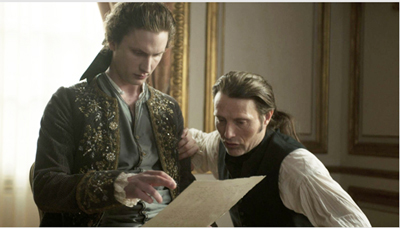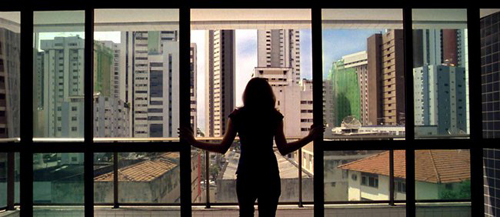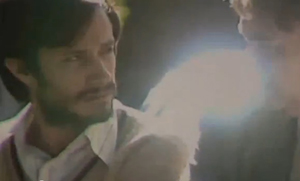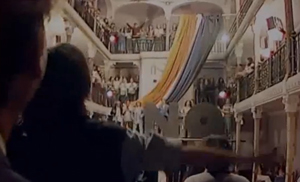More of the world in a multiplex: another dispatch from Vancouver
Thursday | October 11, 2012 open printable version
open printable version
Kristin here:
Latin America
In my first report, I mentioned that the Iranian film A Respectable Family was an unexpected gem. I’ve come across another, the Brazilian film, Neighboring Sounds (2012). It has a remarkable formal device that unfortunately I can’t disclose without ruining the film for those who haven’t seen it. It’s a technique that takes a while to figure out, since it’s cumulative. (Fortunately, unlike with A Respectable Family, I have yet to find a review or program note that mentions it.)
The film is set in Recife, the fifth largest city in Brazil. It centers around members of two families living in a complex of smaller, older houses surrounded by new condo high-rises that will eventually swallow the entire area. (The image above vividly shows the juxtaposition.) The divide between rich and poor is extreme, however, and the residents live in fear of crime, with elaborate gates and with grilles over their windows. Suspense is generated when a small group of men offer their services to provide security for the block, and once they are hired, we are left for a long time to wonder whether this is a cover for some other devious purpose.
The film is beautifully shot, taking advantage of the abstract compositions created by the modern apartment blocks and their glass windows and doors. As director Kleber Mendonça Filho says in the online press kit, “Architecture gone wrong is a nuisance, but extremely photogenic.”
The film’s title is taken literally, with many layers of offscreen sounds from nearby houses and streets forming much of the soundtrack. The complex use of Dolby Surround makes it especially desirable to view and listen to this film in a theater.
Neighboring Sounds has been picked up for US distribution by the Cinema Guild, which has handled other films we’ve enjoyed here in Vancouver , most notably Once upon a Time in Anatolia and The Strange Case of Angelica (and written about here and here, both available on DVD and Blu-ray.)
The Chilean film No (2012), starring Gael Garcia Bernal, has already gained a high reputation on the festival scene. (Like A Respectable Family, it was shown in the Directors’ Fortnight at Cannes.) David and I both thought it lived up to its buzz.
The plot deals with the 1988 referendum as to whether dictator Augusto Pinochet would remain in power. The side campaigning for the “no” vote was allowed a single 15-minute TV commercial each evening. Bernal plays a successful director of TV ads, Rene, who is lured into devising this commerical; he’s introduced showing off his latest spot for “Free” cola. He conceives of a campaign based on breezy optimism, with musical numbers (below right) and shots of cheerful workers acting as if Pinochet is already out of office. His tactics disgust several of the left-wing party leaders, as well as Rene’s estranged wife.
Technically the film is cleverly done. It was shot on old-fashioned U-matic video and shown in Academy ratio (not exactly reflected in these frames from the online trailer). Fuzzy images with occasional overexposure and other video artifacts not only suggest a period piece, but they also allow director Pablo Larraín (Tony Manero, Post Mortem) to seamlessly edit in historical footage of Pinochet and street clashes from 1988. No generates considerable suspense as well, whether or not one knows how the referendum turned out.
Sony Pictures Classics picked up No at Cannes and currently lists its release date as to be announced; according to IMDB, it will have a limited release in the USA on February 15.
Europe
A Royal Affair (2012, Nikolaj Arcel) has been chosen as Denmark’s entry for the Best Foreign Language Film Oscar. Of course, the long list of entries from various countries will be reduced to five before the voting occurs. Still, I wouldn’t be surprised if A Royal Affair ended up on the final list and even took the top award. In a way, it’s just what the Academy members like: a big, glossy costume drama based on uplifting historical events.
But I was relieved to discover that this is no Merchant-and-Ivory-style middle-brow adaptation. It’s a fascinating example of what happens when a bunch of leftist, cutting-edge filmmakers get their hands on a budget to make an historical epic. Although the film’s title and publicity center on the illicit romance that provides part of the drama, A Royal Affair focuses largely on politics. Its plot is loosely based on historical events during the Age of Enlightenment, during which Denmark initially remained a backward country based on serfdom, summary arrest, torture, and execution, and grinding poverty for the lower classes.
The opening shows the heroine, Caroline, born an English princess and wed to Danish King Christian VII, writing the story of her life for her children. A flashback then begins the story proper, with Caroline optimistically setting out for Denmark and quickly discovering that her husband is an impetuous, rude and possibly insane young man who cares nothing for her. Her loneliness and the backward situation in Denmark are gradually established. Eventually a young doctor, Struensee, who believes in the ideas of the Enlightenment philosophers, comes to court and befriends the king, helping him to behave in a more restrained fashion.
Caroline, too, is a devotee of Rousseau, Voltaire, and other authors whose works are banned in Denmark. Nearly an hour  into the film, she discovers that Struensee is of like mind, and a friendship gradually moves into love and a sexual affair. The couple manipulate Christian into passing laws to benefit the peasants, earning the ire of the nobility. The narrative continues to center more on the social struggle that the three carry out than it does on the romance plotline.
into the film, she discovers that Struensee is of like mind, and a friendship gradually moves into love and a sexual affair. The couple manipulate Christian into passing laws to benefit the peasants, earning the ire of the nobility. The narrative continues to center more on the social struggle that the three carry out than it does on the romance plotline.
When I heard that the Silver Bear for Best Actor was awarded to the film at Berlin, I assumed it went to Mads Mikkelsen, who plays Struensee–and seems to star in half the films coming out of Denmark these days (such as Thomas Vinterberg’s The Hunt, also shown this year in the festival). But the role of Christian VII actually seemed to me more challenging. Mikkel Boe Følsgaard has to play a character who begins as border-line insane, crude, and obnoxious, but who also must gain our sympathy when he becomes part of the plot to reform Denmark’s laws. I was delighted to learn upon further inquiry that is was in fact Følsgaard (on the left, with Mikkelsen, in the photo) who won the award. Well deserved.
As the image suggests, the film is shot in muted tones that tend to play down the costumes and sets more than historical dramas usually do. This approach helps direct our attention to the plot and politics rather than the pageantry. In short, I ended up liking the film much more than I expected to.
A Royal Affair will be released in the USA on November 9 by Magnolia Pictures.
At the other end of the budgetary scale is the Portuguese feature The Last Time I Saw Macao (2012, co-directed by João Pedro Rodrigues and João Rui Guerra da Mata). A common impulse among critics seems to be to compare this mysterious, lyrical film to some of Chris Marker’s works. There is little information available on it, but my impression was that the filmmakers shot a lot of lyrical footage of Macau and then concocted a story to fit it. There are shots of buildings, from skyscrapers to disreputable-looking back streets, as well as ephemeral items like some big, gaudy, cartoony balloons of tigers that decorated the streets for a local festival.
The plot has something to do with a mysterious gang, the Chinese zodiac (see image at the bottom), and the end of the world. The hero is barely glimpsed, narrating the story in voiceover (provided by both of the directors). The plot centers on his search for a transvestite named Candy, perhaps the “woman” seen performing a musical number in front of a cage containing live tigers in the sultry opening scene. The song, “You Kill Me,” is among several references to Josef von Sternberg’s Macao.
Despite the shoestring budget, the filmmakers manage convincingly to portray an apocalyptic destruction of the city, followed by bleak shots of deserted, early-morning Macao buildings that effectively suggest the aftermath. It reminded me of Godard’s depiction of a futuristic city in Alphaville, using contemporary buildings and highways.
No US release is planned, but The Last Time I Saw Macao is worth seeking out at upcoming festivals.
A Filmmaker of the World
I’ve mentioned some films that pleasantly surprised me, but almost certainly the best film we saw at Vancouver came as no surprise at all. We both loved Abbas Kiarostami’s Like Someone in Love, but we’re not going to write anything substantive about it, at least not now. It deserves another viewing or two before we could say anything worthwhile–and it hardly needs us to publicize it. The opening scene is fabulous, the subsequent rambling plot absorbing and intriguing, and the end, as so often happens with Kiarostami, puzzling and frustrating. Possibly the man can do no wrong.
IFC has theatrical rights for the USA. Currently its webpage announces “Coming in 2013.” This may mean primarily On Demand, though it would be a pity not to see Like Someone in Love on the big screen.
The end of one multiplex
Rumors circulated almost from the start of the festival, and on October 8 the festival’s director, Alan Franey, revealed officially that the Empire Granville will soon be closing down. A detailed story on the history of the Granville and its closing, with quotations from Franey and representatives of other film festivals that have used the venue, can be found here. Ideally next year’s festival will house most of its screenings in another of the city’s multiplexes, but the new venue is yet to be determined. We hope it will be someplace where we can bounce around the world from screen to screen as easily. The Granville has served us all well and will be missed.

















